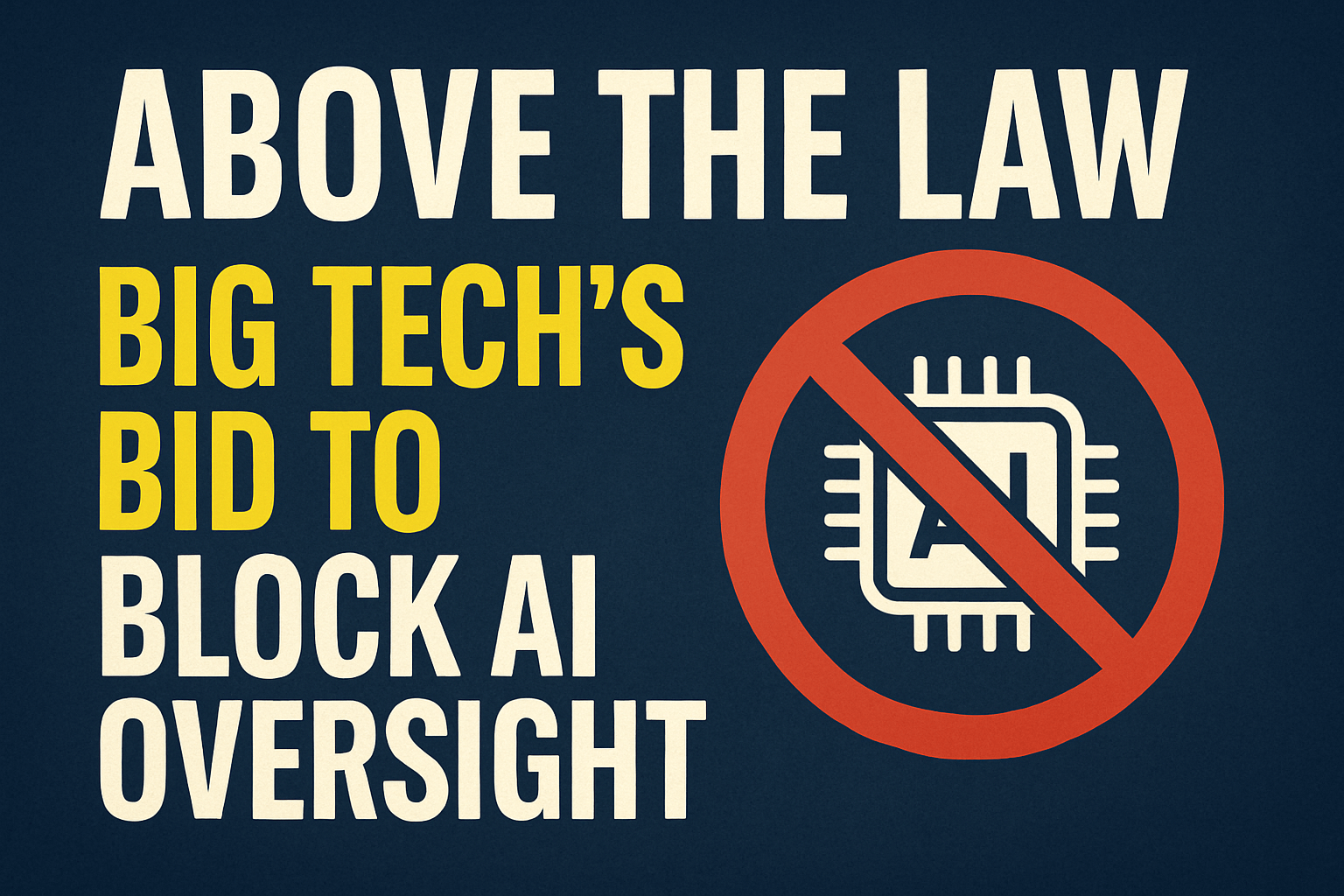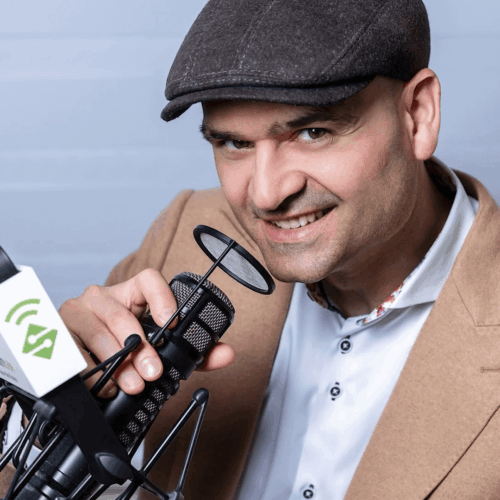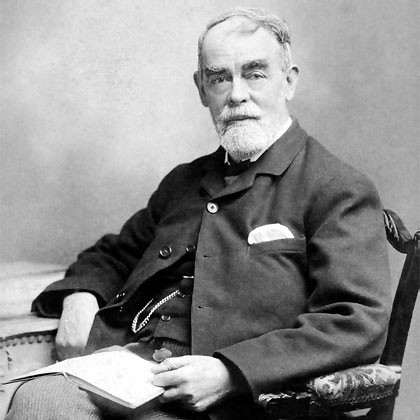Above the Law: Big Tech’s Bid to Block AI Oversight
 In recent years, Big Tech leaders — including Mark Zuckerberg, Tim Cook, Sundar Pichai, and Sam Altman — have made public pronouncements calling for the regulation of artificial intelligence. Some did it in glossy op-eds, while others performed moments of “humility” at congressional hearings. They spoke of responsibility. Of safety. Of the need for oversight.
In recent years, Big Tech leaders — including Mark Zuckerberg, Tim Cook, Sundar Pichai, and Sam Altman — have made public pronouncements calling for the regulation of artificial intelligence. Some did it in glossy op-eds, while others performed moments of “humility” at congressional hearings. They spoke of responsibility. Of safety. Of the need for oversight.
But let’s not be naive.
Behind the curtain of those highly polished performances lies a cold, calculated strategy. While these same leaders were publicly begging for regulation, their companies were privately spending tens of millions of dollars lobbying against it.
And now, they’re not even pretending anymore.
America’s most prominent tech corporations — Amazon, Google, Meta, and Microsoft — are openly pushing for a nationwide ban on AI regulation by individual U.S. states for the next decade. They want the Senate to pass legislation that would pre-empt state-level oversight, stripping California, New York, and every other jurisdiction of their ability to protect their citizens from AI-related harms.
This isn’t about efficiency.
It’s not about innovation.
And it sure as hell isn’t about public safety.
This is a power grab. A bold-faced, unashamed move to ensure that the most powerful industry in the world is above the law.
A Trojan Horse Called “National Consistency”
The rationale, as always, is cloaked in patriotic urgency: “We need to win the AI race against China!”
This line has become the rhetorical duct tape of every dangerous tech policy in the last decade. It’s invoked to dismiss dissent, deflect scrutiny, and defer responsibility.
Big Tech argues that a single federal standard will prevent a “confusing patchwork” of state laws, reduce compliance costs, and protect U.S. innovation. In reality, what they’re asking for is a decade-long moratorium on accountability — a regulatory blank check.
And because AI is already being integrated into everything — phones, cars, medical devices, and even toothbrushes — this legislative overreach could render all meaningful consumer protection ineffective for an entire generation of products.
Imagine a Future Where No One is Responsible
Imagine an AI-powered health app that gives dangerously misleading advice.
Imagine a school system using biased AI tools to score students, disproportionately harming those from marginalized communities.
Imagine a car’s AI-assisted driving system killing a pedestrian because it wasn’t trained to recognize them.
Now imagine no one being held accountable, not even at the state level.
No justice. No recourse. No responsibility. That’s what this bill would mean.
According to a joint letter from over 140 advocacy groups, the moratorium would ensure that, “even if a company deliberately designs an algorithm that causes foreseeable harm — regardless of how intentional or egregious the misconduct — the company would be unaccountable to lawmakers and the public.”
That’s not innovation. That’s institutionalized negligence.
From Regulatory Capture to Legislative Immunity
We’re not just talking about regulatory capture here. That would be too quaint. We are witnessing the attempted legal immunization of an entire sector from democratic oversight.
This isn’t about what’s best for society. It’s about Amazon’s bottom line, Google’s data dominance, Meta’s market share, and Microsoft’s AGI ambitions.
This is Silicon Valley demanding:
“Trust us… for ten more years.”
But trust, like respect, must be earned, not demanded.
Especially from those who have repeatedly shown they do not deserve it.
The Stakes Are Bigger Than AI
Let me be clear: this isn’t just about artificial intelligence.
It’s about the precedent.
If this passes, we will have created a new class of products — and a new class of companies — above the law. Because AI is now integrated into everything, from pacemakers to police body cameras. And if AI cannot be regulated, then, effectively, nothing can.
This is not the separation of powers — it’s the consolidation of power in the hands of the unelected, unaccountable few.
We’ve long championed the separation of church and state.
Maybe it’s time we fight just as hard for the separation of [The Church of] Big Tech and State.
The Ethical Reckoning We Refuse to Have
There can be no meaningful ethics without accountability.
No safety without transparency.
No trust without oversight.
If Big Tech truly believed in regulation, they wouldn’t need to silence the states. They wouldn’t need to buy immunity. And they wouldn’t need to scare us with China every time we dare to question them.
This moment is not just about policy. It’s about values.
It’s about asking: Who governs technology? Who does it serve?
Because if we don’t ask that now, we’ll wake up in a future where democracy is replaced by a neo-technocracy, and we become the tools of our tools.
Update: The Power Grab Didn’t End — It Moved to the Executive Branch
The proposed 10-year moratorium on state-level AI regulation did not pass. It was overwhelmingly rejected by the U.S. Senate: 99 against and only 1 in favor.
But the effort to neutralize state AI oversight did not end there.
In December 2025, President Trump signed an executive order directing the creation of a federal AI Litigation Task Force whose explicit mandate is to challenge state AI laws deemed inconsistent with the administration’s policy vision. The order also threatens to withhold federal broadband funding from states with what the administration characterizes as “onerous” AI regulations, including funds intended to expand high-speed internet access in rural communities.
The mechanism has changed, not the objective.
After the Senate refused to grant a decade of regulatory immunity, the strategy shifted from legislation to executive pressure. The result, if successful, would be essentially the same: the erosion of state authority to oversee, hold accountable, and protect consumers as AI systems are deployed across healthcare, education, transportation, and public infrastructure.
This episode reinforces my core warning. The central conflict is not about innovation versus regulation, nor about federal efficiency versus state “patchworks.” It is about who governs artificial intelligence — and who is allowed to operate beyond meaningful democratic accountability.








